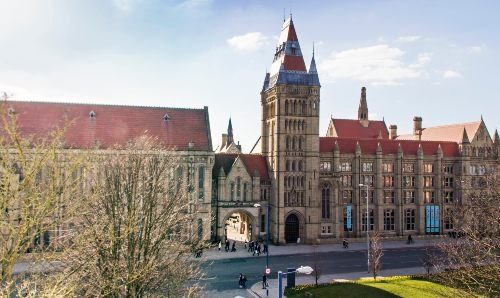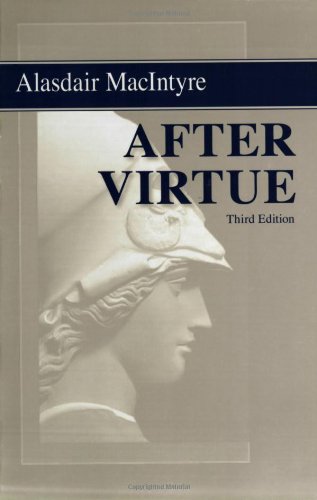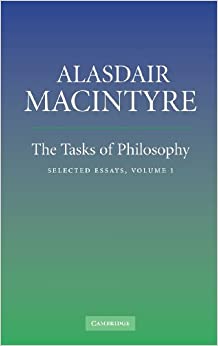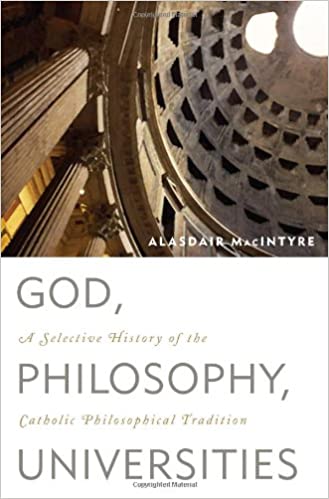Background
Alasdair MacIntyre was born on January 12, 1929, in Glasgow, Scotland, United Kingdom. He is the son of Eneas John and Margaret Emily (Chalmers) MacIntyre, who were physicians, and were born and raised in the West of Scotland.

1992
London, United Kingdom
Alasdair MacIntyre
1992
London, United Kingdom
Alasdair MacIntyre
Alasdair MacIntyre
Mile End Rd, Bethnal Green, London E1 4NS, United Kingdom
Alasdair Chalmers MacIntyre attended the University of London.
Oxford Rd, Manchester M13 9PL, United Kingdom
Alasdair Chalmers MacIntyre studied at Manchester University.
Oxford OX1 2JD, United Kingdom
Alasdair Chalmers MacIntyre studied at Oxford University.
Alasdair MacIntyre
Alasdair MacIntyre
Alasdair MacIntyre
Alasdair MacIntyre
Alasdair MacIntyre
Alasdair MacIntyre
Alasdair MacIntyre
Alasdair MacIntyre





















(A Short History of Ethics guides the reader through the h...)
A Short History of Ethics guides the reader through the history of moral philosophy from the Greeks to contemporary times. MacIntyre emphasizes the importance of a historical context to moral concepts and ideas showing the relevance of philosophical queries on moral concepts and the importance of a historical account of ethics. A Short History of Ethics is an important contribution written by one of the most important living philosophers. Ideal for all philosophy students interested in ethics and morality.
http://www.amazon.com/gp/product/0415173981/?tag=2022091-20
1966

(Contending that Marxism achieved its unique position in p...)
Contending that Marxism achieved its unique position in part by adopting the content and functions of Christianity, MacIntyre details the religious attitudes and modes of belief that appear in Marxist doctrine as it developed historically from the philosophies of Hegel and Feuerbach, and as it has been carried on by latter-day interpreters from Rosa Luxemburg and Trotsky to Kautsky and Lukacs. The result is a lucid exposition of Marxism and an incisive account of its persistence and continuing importance.
http://www.amazon.com/gp/product/0268013586/?tag=2022091-20
1968

(Alasdair MacIntyre is one of the few professional philoso...)
Alasdair MacIntyre is one of the few professional philosophers whose writings span both technical analytical philosophy and those general moral or intellectual questions that laymen often suppose to be the province of philosophy but that are seldom discussed within its bounds. The unity of this book - made up both of original and previously published pieces - lies in its attempt to expose this dichotomy and to link beliefs and moral theories with philosophical criticism. The author successively criticizes Christianity, Marxism, and psychoanalysis for their failure to express the forms of thought and action that constitute our contemporary social life, and argues that a greater understanding of our complex world will require a more thorough inquiry into the philosophy of the social sciences.
http://www.amazon.com/gp/product/0268005877/?tag=2022091-20
1978

(In this classic work, Alasdair MacIntyre examines the his...)
In this classic work, Alasdair MacIntyre examines the historical and conceptual roots of the idea of virtue, diagnoses the reasons for its absence in personal and public life, and offers a tentative proposal for its recovery. While the individual chapters are wide-ranging, once pieced together they comprise a penetrating and focused argument about the price of modernity.
http://www.amazon.com/gp/product/0268035040/?tag=2022091-20
1981

(Three Rival Versions of Moral Enquiry: Encyclopaedia, Gen...)
Three Rival Versions of Moral Enquiry: Encyclopaedia, Genealogy, and Tradition is a book by Scottish-American philosopher Alasdair MacIntyre.
http://www.amazon.com/gp/product/B00XTAR916/?tag=2022091-20
1990

(To flourish, humans need to develop virtues of independen...)
To flourish, humans need to develop virtues of independent thought and acknowledged social dependence. In this book, a leading moral philosopher presents a comparison of humans to other animals and explores the impact of these virtues.
https://www.amazon.com/Dependent-Rational-Animals-Carus-Lectures/dp/0812693973/ref=tmm_hrd_swatch_0?_encoding=UTF8&qid=&sr=
1999

(This edition includes a substantial new preface by the au...)
This edition includes a substantial new preface by the author, in which he discusses repression, determinism, transference, and practical rationality, and offers a comparison of Aristotle and Lacan on the concept of desire. MacIntyre takes the opportunity to reflect both on the reviews and criticisms of the first edition and also on his own philosophical stance.
https://www.amazon.com/Unconscious-Conceptual-Analysis-Alasdair-MacIntyre-dp-0415333032/dp/0415333032/ref=mt_other?_encoding=UTF8&me=&qid=
2004

(Ten of MacIntyre's most influential essays written over a...)
Ten of MacIntyre's most influential essays written over almost thirty years are collected together here for the first time. They range over such topics as the issues raised by different types of relativism, what it is about human beings that cannot be understood by the natural sciences, the relationship between the ends of life and the ends of philosophical writing, and the relationship of moral philosophy to contemporary social practice. They will appeal to a wide range of readers across philosophy and especially in moral philosophy, political philosophy, and theology.
https://www.amazon.com/Tasks-Philosophy-Selected-Essays-dp-0521854377/dp/0521854377/ref=mt_other?_encoding=UTF8&me=&qid=
2006

(Tracing the idea of God through different philosophers' e...)
Tracing the idea of God through different philosophers' engagement of God and how this engagement has played out in universities, MacIntyre provides a valuable, lively, and insightful study of the disintegration of academic disciplines with knowledge. MacIntyre then demonstrates the dangerous implications of this happening and how universities can and ought to renew a shared understanding of knowledge in their mission. This engaging work will be a benefit and a delight to all readers.
https://www.amazon.com/God-Philosophy-Universities-Selective-Philosophical-dp-074254429X/dp/074254429X/ref=mt_other?_encoding=UTF8&me=&qid=
2009

(Alasdair MacIntyre explores some central philosophical, p...)
Alasdair MacIntyre explores some central philosophical, political and moral claims of modernity and argues that a proper understanding of human goods requires a rejection of these claims. In a wide-ranging discussion, he considers how normative and evaluative judgments are to be understood, how desire and practical reasoning are to be characterized, what it is to have adequate self-knowledge, and what part narrative plays in our understanding of human lives.
https://www.amazon.com/Ethics-Conflicts-Modernity-Practical-Reasoning/dp/110717645X/ref=tmm_hrd_swatch_0?_encoding=UTF8&qid=&sr=
2016
Alasdair MacIntyre was born on January 12, 1929, in Glasgow, Scotland, United Kingdom. He is the son of Eneas John and Margaret Emily (Chalmers) MacIntyre, who were physicians, and were born and raised in the West of Scotland.
MacIntyre grew up in and around the city of London. Though Educated in England, MacIntyre learned Scots Gaelic from one of his aunts. He earned a bachelor’s degree in classics from Queen Mary College at the University of London in the city’s East End in 1949. MacIntyre attended graduate school at Manchester University, a provincial "red brick" university in the North West of England, earning his Master of Arts in Philosophy in 1951. In 1961 he also earned a master's degree from the University of Oxford.
MacIntyre’s family had distant ties to County Donegal, in the North of Ireland, and his knowledge of Gaelic helped MacIntyre to make connections to the people there. He has remained close to the cultural and political concerns of Ireland for many years.
MacIntyre began his teaching career at the University of Manchester as a Lecturer in Philosophy of Religion in 1951 and held that post until 1957.
After Manchester, MacIntyre became a member of Britain’s New Left and moved through teaching, research, and administrative positions at other British universities, such as the University of Leeds, the University of Essex, and the University of Oxford, before emigrating from Britain to the United States in 1970.
There his research interests drew him to teaching posts at Brandeis University (1970), Boston University (1972), Wellesley College (1980), Vanderbilt University (1982, 1985), University of Notre Dame (1985), Yale University (1988), and Duke University (1995-1997).
In 2000, Alasdair MacIntyre returned to Notre Dame as the Senior Research Professor in the Notre Dame Center for Ethics and Culture, and he worked there until his retirement in 2010.
After his retirement from teaching, MacIntyre has continued his work of promoting a renewal of human agency through an examination of the virtues demanded by practices, integrated human lives, and responsible engagement with community life. He is currently affiliated with the Centre for Contemporary Aristotelian Studies in Ethics and Politics (CASEP) at London Metropolitan University.
Alasdair MacIntyre has authored 19 books and edited five others. His most important book, After Virtue (1981), has been called one of the most influential works of the moral philosophy of the late 20th century. After Virtue and his other major works, including Marxism: An Interpretation (1953), A Short History of Ethics (1966), Marxism and Christianity (1968), Against the Self-Images of the Age (1971), Whose Justice? Which Rationality? (1988), Three Rival Versions of Moral Enquiry (1990), and Dependent Rational Animals (1999) have shaped academic moral philosophy for six decades.
A Short History of Ethics served as a standard text for college courses in the history of moral philosophy for many years; After Virtue remains a widely used ethics textbook in undergraduate and graduate education. MacIntyre has published about two hundred journal articles and roughly one hundred book reviews, addressing concerns in ethics, politics, the philosophy of the social sciences, Marxist theory, Marxist political practice, the Aristotelian notion of excellence or virtue in human agency, and the interpretation of Thomistic metaphysics, epistemology, and ethics.
MacIntyre’s mature work, initiated by the 1977 essay, Epistemological Crises, Dramatic Narrative, and the Philosophy of Science, draws upon the study of traditions, and the examination of the narratives that inform traditions of scientific, philosophical, and social practice, as a philosophical method. After Virtue and the whole body of work that follows it, employ this philosophical method in the study of moral and political philosophy.
The contribution to the contemporary philosophy of Alasdair MacIntyre is enormous. His writings on ethics, political philosophy, philosophy of religion, philosophy of the social sciences, and the history of philosophy have established him as one of the philosophical giants of the last fifty years. Moreover, MacIntyre, unlike so many of his contemporaries, has exerted a deep influence beyond the bourns of academic philosophy.
Later in life, he was awarded an Honorary Doctor of Hebrew Literature degree from Swarthmore College in 1983, an Honorary Doctor of Letters from Queen's University, Belfast, Ireland, in 1968, and others.
(Contending that Marxism achieved its unique position in p...)
1968(Alasdair MacIntyre is one of the few professional philoso...)
1978(Tracing the idea of God through different philosophers' e...)
2009(In this classic work, Alasdair MacIntyre examines the his...)
1981(This edition includes a substantial new preface by the au...)
2004(Alasdair MacIntyre explores some central philosophical, p...)
2016(Three Rival Versions of Moral Enquiry: Encyclopaedia, Gen...)
1990(Ten of MacIntyre's most influential essays written over a...)
2006(A Short History of Ethics guides the reader through the h...)
1966(To flourish, humans need to develop virtues of independen...)
1999In the 1980s Alasdair MacIntyre was converted to Roman Catholicism.
MacIntyre once said about politics: "What this brings out is that modern politics cannot be a matter of genuine moral consensus. And it is not. Modern politics is civil war carried on by other means."
He was a member of the Communist Party of Great Britain until 1956, then was involved in Socialist Labour League for a short period of time, and finally in Socialist Workers Party.
MacIntyre began his career as a Marxist, but in the late 1950s, he started working to develop Marxist ethics that could rationally justify the moral condemnation of Stalinism. That project eventually led him to reject Marxism along with every other form of “modern liberal individualism” and to propose Aristotle’s ethics as a more effective way to renew moral agency and practical rationality through small-scale moral formation within communities.
MacIntyre’s best-known book, After Virtue (1981), is the product of this long ethical project. After Virtue diagnoses contemporary society as a “culture of emotivism” in which moral language is used pragmatically to manipulate attitudes, choices, and decisions, so that contemporary moral culture is a theater of illusions in which objective moral rhetoric masks arbitrary choices. MacIntyre followed After Virtue with two books examining the role that traditions play in judgments about truth and falsity, Whose Justice? Which Rationality? (1988) and Three Rival Versions of Moral Enquiry (1990). MacIntyre’s next major work, Dependent Rational Animals: Why Human Beings Need the Virtues (1999), investigates the social needs and social debts of human agents, and the role that a community plays in the formation of an independent practical reasoner. The remainder of MacIntyre’s mature work extends and supplements the arguments of these four major works.
MacIntyre’s philosophy is important to the fields of virtue ethics and communitarian politics, but MacIntyre has denied belonging to either school of thought. MacIntyre has identified himself as a Thomist since 1984, but some Thomists question his Thomism because he emphasizes Thomas Aquinas’s treatment of human agency but rejects the neo-Thomist project of a creating a Thomist moral epistemology based on the metaphysics of human nature. MacIntyre continues to point out the irrelevance of conventional business ethics, conceived as an application of modern moral theories to business decision making, but some scholars in the field of business ethics have begun to apply MacIntyre’s Aristotelian account of agency and virtue to the study of organizational systems, to develop ways of renewing moral agency and practical rationality within companies. MacIntyre has played an important role in the renewal of Aristotelian ethics and politics in the last three decades and has made a valued contribution to the advancement of Thomistic philosophy.
Quotations:
"I can only answer the question ‘What am I to do?’ if I can answer the prior question ‘Of what story or stories do I find myself a part?’"
"What matters at this stage is the construction of local forms of community within which civility and the intellectual and moral life can be sustained through the new dark ages which are already upon us. And if the tradition of the virtues was able to survive the horrors of the last dark ages, we are not entirely without ground for hope. This time however the barbarians are not waiting beyond the frontiers; they have already been governing us for quite some time."
"Virtues are dispositions not only to act in particular ways but also to feel in particular ways. To act virtuously is not, as Kant was later to think, to act against inclination; it is to act from inclination formed by the cultivation of the virtues."
"The good life for man is the life spent in seeking the good life for man, and the virtues necessary for the seeking are those which will enable us to understand what more and what else the good life for man is."
"Christians have given atheists less and less in which to disbelieve."
"Truth has been displaced as a value and replaced by psychological effectiveness."
"At the foundation of moral thinking lie beliefs in statements the truth of which no further reason can be given."
"Modern society is indeed often, at least in surface appearance, nothing but a collection of strangers, each pursuing his or her own interests under minimal constraints."
"The bureaucratic manager, the consuming aesthete, the therapist, the protester and their numerous kindred occupy almost all the available culturally recognizable roles, the notions of the expertise of the few and of the moral agency of everyone are the presuppositions of the dramas which those characters enact. To cry out that the emperor had no clothes on was at least to pick on one man only to the amusement of everyone else; to declare that almost everyone is dressed in rags is much less likely to be popular."
"A crucial turning point in that earlier history occurred when men and women of goodwill turned aside from the task of shoring up the Roman imperium and ceased to identify the continuation of civility and moral community with the maintenance of that imperium. What they set themselves out to achieve instead - often not recognizing fully what they were doing - was the construction of new forms of community within which the moral life could be sustained so that both morality and civility might survive the coming age of barbarism and darkness."
"It is through hearing stories about wicked stepmothers, lost children, good but misguided kings, wolves that suckle twin boys, youngest sons who receive no inheritance but must make their own way in the world, and eldest sons who waste their inheritance on riotous living and go into exile to live with the swine, that children learn or mislearn both what a child and what a parent is, what the cast of characters may be in the drama into which they have been born and what the ways of the world are."
Alasdair MacIntyre is a Fellow of the American Academy of Arts and Sciences, and a correspondent to the British Academy. He is also an honorary member of Phi Beta Kappa.
Scottish Gaelic
Thomas Aquinas, Aristotle, Max Weber
MacIntyre married Ann Peri in 1953 (divorced in 1963) and they had two daughters, Jean and Toni. Also in 1963 he married his second wife, Susan Margery Willans, and had one son and one daughter. They divorced in 1977. He married Lynn Sumida Joy later the same year. They had no children.


Honorary Doctor
